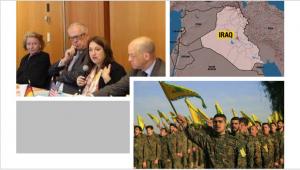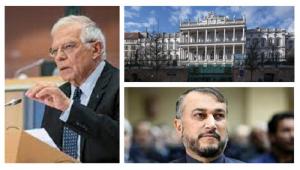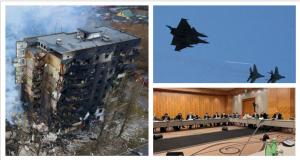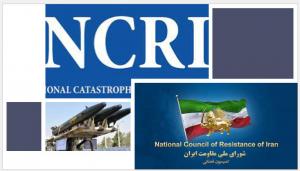France - Amsterdam Aesthetics originally published at France - Amsterdam Aesthetics
In a recent phone call with Iranian regime Foreign Minister Hossein Amir-Abdollahian, Josep Borrell, the European Union’s High Representative for Foreign Affairs and Security Policy, warned about the continuing halt to the nuclear talks.

Jennifer Gavito, the U.S. Acting Principal Deputy Assistant Secretary of State for Near East Affairs, said on April 22, “The U.S. is deeply concerned about Iranian malign influence, especially as it undermines the stability and integrity of Iraq’s sovereignty.”
The war in Ukraine is changing the international status quo, including the world powers rethinking their approach to the mullahs’ regime and the nuclear talks.
— MEK
PARIS, FRANCE, April 26, 2022 /EINPresswire.com/ — Following the November 2020 U.S. presidential election and a new administration entering the White House, the mullahs’ regime in Iran launched a brouhaha about “new opportunities” and former regime president Hassan Rouhani emphasized on November 12, 2021, that “no one is permitted to miss out on this opportunity!” Proponents of this initiative believed a Democrat administration in the U.S. will provide “a better atmosphere for closer relations and better engagement.”
Some 15 months into the new U.S. administration, we have witnessed eight rounds of fruitless negotiations aimed at revitalizing the 2015 nuclear deal.
Not only has U.S. President Joe Biden refrained from reentering the 2015 nuclear deal and lifting significant sanctions, but in fact, the Iranian regime is suffering from increasing isolation.
In a recent phone call with Iranian regime Foreign Minister Hossein Amir-Abdollahian, Josep Borrell, the European Union’s High Representative for Foreign Affairs and Security Policy, warned about the continuing halt to the nuclear talks.
Linda Thomas-Greenfield, the U.S. Ambassador to the United Nations, has recently said there is no agreement with the Iranian regime and blamed the mullahs for blocking progress in the nuclear talks.
A U.S. State Department spokesperson said even in the case of an agreement there will not be any sanctions relief beyond the Joint Comprehensive Plan of Action (JCPOA), referring to the 2015 nuclear term its official title, adding if the Iranian regime is seeking sanctions relief beyond the JCPOA, it needs to address concerns that go beyond the nuclear deal.
This means the regime must forgo or at least deescalate its support for terrorism and stop its destabilizing activities in the Middle East as part of what it has termed strategic depth in the region.
It is worth noting that back in June 2016 regime Supreme Leader Ali Khamenei specifically described such an outcome as the beginning of the end of his regime.
Jennifer Gavito, the U.S. Acting Principal Deputy Assistant Secretary of State for Near East Affairs, said on April 22, “the U.S. is deeply concerned about Iranian malign influence, especially as it undermines the stability and integrity of Iraq’s sovereignty and national institutions Iran cannot believe that it can continue to conduct diplomacy with one hand while deploying or supporting violence with the other.”
Furthermore, the Spanish judiciary has issued a ruling to extradite a Turkish national on charges of smuggling banned equipment for the Iranian regime.
Turkish media have also reported an indictment being issued for 16 individuals on charges of collaborating with Iranian regime spies to kidnap and return Iranian refugees to the mullahs’ regime.
U.S. officials adopting a stronger tone in their recent positions and a series of measures against the mullahs’ regime can be attributed to changes seen across the globe.
The war in Ukraine is changing the international status quo, including the world powers rethinking their approach to the mullahs’ regime and the nuclear talks. Experts associated with the regime’s institutions are issuing meaningful warnings in this regard.
“The Americans have reached this conclusion that the JCPOA dossier is less important than the war in Ukraine the P4+1, and even China and Russia, are not allocating urgent attention to a quick agreement as they used to in the past,” said former Iranian MP Mohammad Khoshchehreh on April 21.
Pressures on the U.S. administration from Middle East countries, especially Saudi Arabia and Israel, and their opposition to any concession to the mullahs’ regime.
Growing bipartisan opposition in the U.S. Congress against any concession to Tehran in the Vienna nuclear talks.
Expansive measures and revelations the Iranian opposition coalition National Council of Resistance of Iran (NCRI) continue to shed light on the Iranian regime’s ongoing support for terrorism, and the destructive Revolutionary Guards (IRGC) role in the mullahs’ foreign terrorism and domestic crackdown.
As a result, the “opportunity” that senior regime officials in Iran were poised to cash in has not materialized. In fact, Iran’s regime has become more isolated and its hand has weakened.
As the world continues to experience unprecedented changes since World War II, parallel to the Iranian society becoming all the more explosive with every passing day, the future looks quite challenging and bleak for the mullahs’ regime with fewer, if any, opportunities in the near future.
Shahin Gobadi
NCRI
+33 6 61 65 32 31
email us here
Gold Star families and wounded US called for IRGC to remain designated as a terror group and they asked President Biden to keep IRGC on the list of FTO.
![]()
The post (Video) Changing times add to the mullahs’ isolation in Iran first appeared on Siver News.
The post (Video) Changing times add to the mullahs’ isolation in Iran first appeared on Amsterdam Aesthetics.
France - Amsterdam Aesthetics originally published at France - Amsterdam Aesthetics




 ,
,